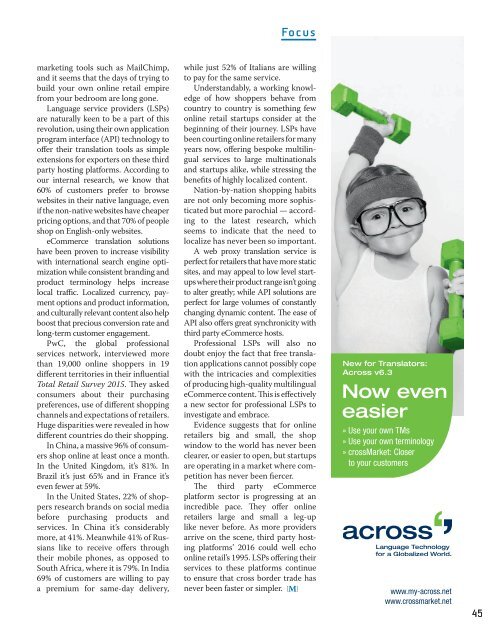Localization
z99kl79
z99kl79
Create successful ePaper yourself
Turn your PDF publications into a flip-book with our unique Google optimized e-Paper software.
Focus<br />
marketing tools such as MailChimp,<br />
and it seems that the days of trying to<br />
build your own online retail empire<br />
from your bedroom are long gone.<br />
Language service providers (LSPs)<br />
are naturally keen to be a part of this<br />
revolution, using their own application<br />
program interface (API) technology to<br />
offer their translation tools as simple<br />
extensions for exporters on these third<br />
party hosting platforms. According to<br />
our internal research, we know that<br />
60% of customers prefer to browse<br />
websites in their native language, even<br />
if the non-native websites have cheaper<br />
pricing options, and that 70% of people<br />
shop on English-only websites.<br />
eCommerce translation solutions<br />
have been proven to increase visibility<br />
with international search engine optimization<br />
while consistent branding and<br />
product terminology helps increase<br />
local traffic. Localized currency, payment<br />
options and product information,<br />
and culturally relevant content also help<br />
boost that precious conversion rate and<br />
long-term customer engagement.<br />
PwC, the global professional<br />
services network, interviewed more<br />
than 19,000 online shoppers in 19<br />
different territories in their influential<br />
Total Retail Survey 2015. They asked<br />
consumers about their purchasing<br />
preferences, use of different shopping<br />
channels and expectations of retailers.<br />
Huge disparities were revealed in how<br />
different countries do their shopping.<br />
In China, a massive 96% of consumers<br />
shop online at least once a month.<br />
In the United Kingdom, it’s 81%. In<br />
Brazil it’s just 65% and in France it’s<br />
even fewer at 59%.<br />
In the United States, 22% of shoppers<br />
research brands on social media<br />
before purchasing products and<br />
services. In China it’s considerably<br />
more, at 41%. Meanwhile 41% of Russians<br />
like to receive offers through<br />
their mobile phones, as opposed to<br />
South Africa, where it is 79%. In India<br />
69% of customers are willing to pay<br />
a premium for same-day delivery,<br />
while just 52% of Italians are willing<br />
to pay for the same service.<br />
Understandably, a working knowledge<br />
of how shoppers behave from<br />
country to country is something few<br />
online retail startups consider at the<br />
beginning of their journey. LSPs have<br />
been courting online retailers for many<br />
years now, offering bespoke multilingual<br />
services to large multinationals<br />
and startups alike, while stressing the<br />
benefits of highly localized content.<br />
Nation-by-nation shopping habits<br />
are not only becoming more sophisticated<br />
but more parochial — according<br />
to the latest research, which<br />
seems to indicate that the need to<br />
localize has never been so important.<br />
A web proxy translation service is<br />
perfect for retailers that have more static<br />
sites, and may appeal to low level startups<br />
where their product range isn’t going<br />
to alter greatly; while API solutions are<br />
perfect for large volumes of constantly<br />
changing dynamic content. The ease of<br />
API also offers great synchronicity with<br />
third party eCommerce hosts.<br />
Professional LSPs will also no<br />
doubt enjoy the fact that free translation<br />
applications cannot possibly cope<br />
with the intricacies and complexities<br />
of producing high-quality multilingual<br />
eCommerce content. This is effectively<br />
a new sector for professional LSPs to<br />
investigate and embrace.<br />
Evidence suggests that for online<br />
retailers big and small, the shop<br />
window to the world has never been<br />
clearer, or easier to open, but startups<br />
are operating in a market where competition<br />
has never been fiercer.<br />
The third party eCommerce<br />
platform sector is progressing at an<br />
incredible pace. They offer online<br />
retailers large and small a leg-up<br />
like never before. As more providers<br />
arrive on the scene, third party hosting<br />
platforms’ 2016 could well echo<br />
online retail’s 1995. LSPs offering their<br />
services to these platforms continue<br />
to ensure that cross border trade has<br />
never been faster or simpler. [M]<br />
45


